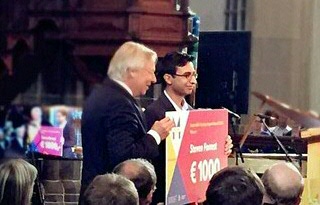Steven Forrest wins first Sustainable Society Impact Award

PhD student Steven Forrest, Faculty of Spatial Sciences, is the winner of the first Sustainable Society Impact Award. His research focus is flood resilience. During the opening of the academic year on September 5, Mayor of Groningen Peter den Oudsten, handed Forrest the €1000,- cheque.
Award
To celebrate Sustainable Society’s first Lustrum in September 2016, Sustainable Society organised the Impact Award for PhD’s. This award was for all PhD students at the University of Groningen to stimulate societal impact from scientific research. The award was also part of the Horizon 2020 project ACCOMPLISSH that is being coordinated by Sustainable Society (www.accomplissh.eu). To win this award, PhD’s were challenged to show in a 60-second video-pitch what his/her research is about and how society can profit from it. The Impact Award is all about creativity, innovation and of course impact. The awarded money is meant for the PhD to invest in expanding both their academic and non-academic network related to the research topic: 1st place - €1000,- + presentation of his/her research in Rome, Italy (ACCOMPLISSH event, 20-22 November), 2nd place - €750,-, 3rd place - €500,-
Jury
The video’s were judged by our expert jury, consisting of: Nicol Keith, University of Glasgow, Renée van Kessel - Hagesteijn, Director Social Sciences of NWO, Peter den Oudsten, Mayor of Groningen and Sharon Smit, Director of Sustainable Society and coordinator of ACCOMPLISSH. 25 PhD's participated in the competition, and the jury has decided on the top-3: 1. Steven Forrest, Faculty of Spatial Sciences 2. Daniël Postma, Faculty of Arts and 3. Stephanie Jurburg, Faculty of Mathematics and Natural Sciences.
Flood resilience
Forrest: "Flooding is an issue that disrupts society: resulting in buildings being damaged, transport links being cut off, and people being injured or even killed. It is expected to get worse due to the twin challenges of urbanisation and climate change. It affects previously flooded areas, but also areas that have never experienced flooding before and are therefore unprepared for flooding and unable to respond and recover from its effects. Traditionally the focus has been on resistance and flood hazard control using not sustainable. There needs to be a transition to a more sustainable future for cities, communities and society as a whole. This transition has started in the paradigm shift towards flood resilience, which takes a holistic approach to flooding that places a greater emphasis on people and the role of society in preventing, preparing, responding and recovering with floods. My research focuses on the role of society, namely local officials, communities and citizens, in making places more resilient and more sustainable for the future. As part of this, I am working on different strategies to reach both scientific and non-scientific audiences during the final two years of my PhD. Entering this competition is one of these strategies."
More information
-
All videos are show-cased on the website of Sustainable Society.
More news
-
01 December 2025
The power of movement


